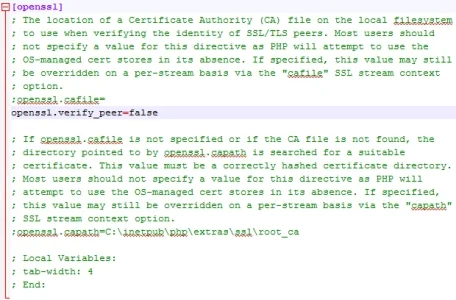Sam Forbis
Member
I recently moved my Xenforo installation from an Linux/Apache machine to a Windows 2008 R2 machine running IIS 7.5. Everything is working flawlessly except for initiating remote SSL connections to services such as Google. Here's what is logged every time someone tries to log in with Google:
Stack Trace:
Request State:
Google login isn't the only external connection that throws an error, Facebook does it as well. I'm also using the new reCaptcha feature by Google, and it throws an SSL error when someone is signing up as well.
When a user tries to log in with Google, this shows up:

Similarly, when Facebook is used, this shows up:

I have the openssl extension uncommented from my php.ini file and my extensions directory is defined properly. Any help would be greatly appreciated.
Code:
Zend_Http_Client_Adapter_Exception: Unable to Connect to ssl://accounts.google.com:443. Error #0: - library\Zend\Http\Client\Adapter\Socket.php:235Stack Trace:
Code:
#0 C:\inetpub\sites\forbis_xenforo\library\Zend\Http\Client.php(973): Zend_Http_Client_Adapter_Socket->connect('accounts.google...', 443, true)
#1 C:\inetpub\sites\forbis_xenforo\library\XenForo\ControllerPublic\Register.php(1030): Zend_Http_Client->request('POST')
#2 C:\inetpub\sites\forbis_xenforo\library\XenForo\FrontController.php(347): XenForo_ControllerPublic_Register->actionGoogle()
#3 C:\inetpub\sites\forbis_xenforo\library\XenForo\FrontController.php(134): XenForo_FrontController->dispatch(Object(XenForo_RouteMatch))
#4 C:\inetpub\sites\forbis_xenforo\index.php(13): XenForo_FrontController->run()
#5 {main}Request State:
Code:
array(3) {
["url"] => string(151) "http://forums.forbisgaming.com/register/google?code=4/jDPYJwhLGYTgXBaGgibyciJC2rQQajlhCbxo-Yz63Kk.kntOXrTFnYIa3oEBd8DOtNDj7LcTlwI&csrf=G4eyd6Zv1eqIFSvK"
["_GET"] => array(2) {
["code"] => string(77) "4/jDPYJwhLGYTgXBaGgibyciJC2rQQajlhCbxo-Yz63Kk.kntOXrTFnYIa3oEBd8DOtNDj7LcTlwI"
["csrf"] => string(16) "G4eyd6Zv1eqIFSvK"
}
["_POST"] => array(0) {
}
}Google login isn't the only external connection that throws an error, Facebook does it as well. I'm also using the new reCaptcha feature by Google, and it throws an SSL error when someone is signing up as well.
When a user tries to log in with Google, this shows up:

Similarly, when Facebook is used, this shows up:

I have the openssl extension uncommented from my php.ini file and my extensions directory is defined properly. Any help would be greatly appreciated.
